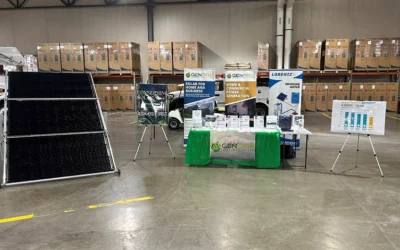WHAT ENERGY STORAGE IS BEST FOR YOU?
How to determine the best storage solution for you.
As you consider investing in an energy storage solution (ESS), you may be overwhelmed with all the choices and the mountain of information you need to gather to determine the best solution for you. Calculation, technical terms, size requirements, manufacturer evaluation, system layout and design can be daunting. However, GenPro’s sales engineers are among the industry’s finest certified system designers. Serving as your personal design expert, a GenPro sales engineer will patiently guide you through the entire process of selecting the best battery, inverter and balance of system components for your energy storage solution. We guarantee you’ll be offered one of the most reliable energy solutions available for your home or office.
Capacity & power
Capability is the total quantity of electrical power that a solar battery can store, measured in kilowatt-hours (kWh). Today, many residential solar batteries are “stackable,” which indicates that you can combine multiple batteries with your energy storage system to get additional system capacity.
While capacity tells you how much total electrical power your battery bank can store, it doesn’t provide a complete picture. A critical piece of information needed to determine the overall system design is time. For simplification purposes, you will not only need to understand the total amount of electrical power you can store, but you also need to know how much electrical power (we call this load) you are using over a given time. The simple calculation of load (measured in watts) x time (minutes or hours) = watt-hours (Wh) or kilowatt-hours (kWh) provides us with enough information to begin the sizing process.
Depth of discharge (DoD)
Traditional battery technologies require a continuous charge due to chemical composition. These batteries’ useful life is substantially shortened when the depth-of-discharge (DoD) is below fifty percent. GenPro’s energy storage technologies solve the traditional challenges of previous batteries with an entirely different chemical composition. Our energy solutions reduce system weight and allow for a depth-of-discharge (DoD) over 90% without impeding the storage solution’s long-term
Battery life & warranty
For many uses of home energy storage, your battery will “cycle” (charge and drain) daily. The battery’s capability to hold a charge will gradually decrease the more you use it. In this way, solar batteries are like the battery in your cellular phone– you charge your phone each night to utilize it during the day, and as your phone grows older, you’ll start to discover that the battery isn’t holding as much of a charge as it did when it was new. Most traditional batteries are warrantied for 350-3000 cycles or 1-3 years at 70 percent of its original capacity. This implies that at the end of the guarantee, the battery will have lost no more than 30 percent of its initial capability to keep energy.
When you choose a GenPro battery solution, our batteries start with a 5,000 minimum cycle guarantee. Ensuring that you will have the power you need when you need it most.
For how long will my energy storage solution last?
There are 2 methods to address this question and the very first is to figure out how long a solar ESS can power your home. In many cases, a completely charged ESS can run your home overnight when your photovoltaic panels are not producing any energy. To make a more specific computation, you’ll need to know a couple of variables, including how much energy your family consumes in a given day, what the capacity and power ranking is for your ESS and whether you are linked to the electric grid.
For the sake of a simple example, we’ll determine the size of an ESS needed to supply your home utilizing typical nationwide information from the U.S. Energy Information Administration. The typical U.S. home will use roughly 30 kilowatt-hours (kWh) of energy per day and a typical battery can deliver approximately 10 kWh of capacity. Thus, an extremely simple answer would be, if you purchased three batteries, you might run your home for an entire day with nothing but battery assistance.
In reality, the answer is more complicated than that. You will also be creating power with your photovoltaic panel system during the day which will provide consistent power for approximately 6-7 hours of the day throughout peak sunshine hours. On the other hand, the majority of batteries cannot perform at optimal capacity and generally peak at a 90% DoD (as discussed above). As a result, your 10 kWh battery likely has a beneficial capacity of 9 kWh.
SUBSCRIBE FOR THE LATEST NEWS & UPDATES
West River Electric Customer Appreciation Day Drawing Winner
GenPro Energy Solutions was given the opportunity to be a part of West River Electric customer...
GenPro News Tanner and Jeff promotion
I am delighted to share some exciting news with all of you. It is my absolute pleasure to announce...
Follow Us
Ultimately, if you are combining your battery with a solar PV array, a couple of batteries can provide enough power during nighttime when your solar panels are not producing. Without a sustainable energy solution, you might require 3 batteries or more to power your whole home for 24 hours. Furthermore, if you are installing home energy storage in order to detach from the electric grid, you should set up a couple of days’ worth of backup power to account for days where you may have cloudy weather conditions.
Energy Storage Solution life-span
Traditional battery technologies have a life cycle of 350-3000 total cycles. If this is the case, then a traditional battery system cycling one time per day would have a given life expectancy of 1-8 years. However, GenPro’s advanced Energy Storage Solutions are designed to cycle between 5,000 and 15,000 cycles providing a minimum of 14 years of life expectancy.
Traditional batteries require maintenance which will have a significant impact on a traditional battery’s life expectancy. Traditional batteries are also substantially affected by temperature level, so safeguarding your traditional battery from freezing or blistering temperatures can increase its beneficial life. When a traditional battery drops listed below 30 ° F, it will require more voltage to reach maximum charge; when that exact same battery rises above the 90 ° F threshold, it will end up being overheated and require a decrease in charge. To resolve this problem, today’s leading ESS providers like GenPro supply special charging functions to deal with temperature challenges as a feature. However, if the battery that you buy does not, you will require to think about other services like earth-sheltered enclosures. Quality upkeep efforts can certainly affect the length of time your traditional battery will last.
What are the different types of ESS batteries?
Batteries used in home energy storage usually are made with among three chemical compositions: traditional lead acid, lithium ion, and saltwater. Lithium-ion batteries are the best choice for a solar panel system and what GenPro utilizes exclusively, though other battery types can have a lower entry price.
Lead acid
Lead acid batteries are an old innovation that has actually been used in off-grid energy systems for decades. While they have a relatively brief life and lower DoD than other battery types, they are also among the lowest price choices presently on the market within the home energy storage sector. For house owners who wish to go off the grid and require to set up lots of energy storage, lead acid can be an economical option.
Lithium-ion
The majority of brand-new home energy storage technologies, such as GenPro’s, use some form of lithium-ion chemical composition. Lithium-ion batteries are lighter and more compact than lead acid batteries. They also have a greater DoD and longer life-span when compared to lead acid batteries. Nevertheless, lithium-ion batteries are more costly than their lead acid equivalents. However, not all Lithium batteries are created equal. GenPro exclusively utilizes Lithium-Ion Phosphate in all our ESS. We encourage you to ask our sales engineers why we don’t use other Lithium chemistries.
Saltwater
A newcomer in the home energy storage industry is the saltwater battery. Unlike other home energy storage options, saltwater batteries do not consist of heavy metals, relying instead on saltwater electrolytes. While batteries that utilize heavy metals, consisting of lead acid and lithium-ion batteries, need to be dealt with unique procedures, a saltwater battery can be quickly recycled. As a new innovation, saltwater batteries are relatively untested, and the one company that makes solar batteries for home usage (Aquion) submitted for personal bankruptcy in 2017.


